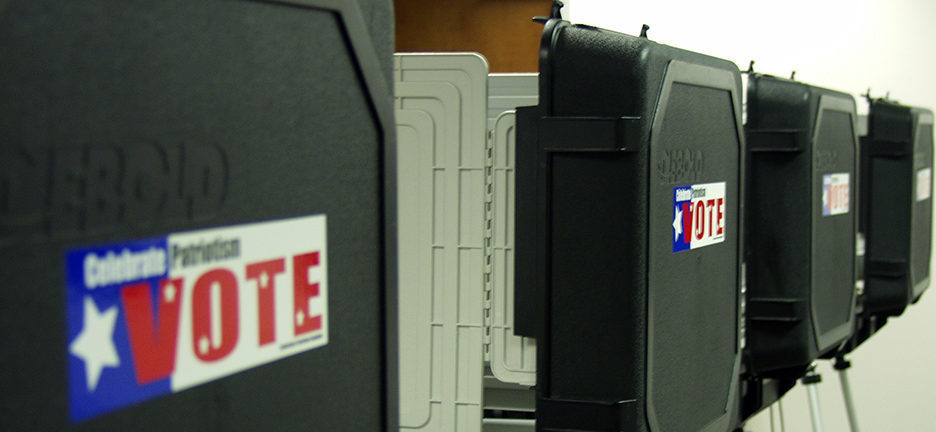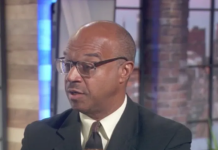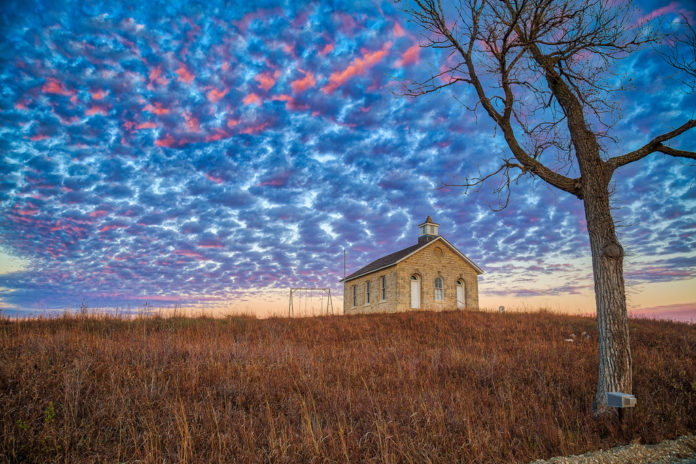Good morning everyone:
We started last week with heartbreaking news that Rep. Greg Lewis passed away in the early morning hours of Feb. 17 before lawmakers returned to the Capitol.
Lewis’ passing came almost a year to the day after he made a stirring speech in the House chamber, telling how his faith had given him joy in the face of a mortal illness.
It was a speech we won’t forget any time soon.
It was extraordinarily busy last week, and we can only hope it slows down so someone can celebrate their birthday Tuesday.
So please take it easy this week. Running up and down the stairs of the Capitol and dashing in and out of committee rooms isn’t as easy as it was six or seven years ago.
And before we move on, another shameless, self-promotional plug for our Facebook site, which needs some love.
Now onto the significant stories that we published last week and other stories that you may have missed but need to know…
- Gov. Laura Kelly’s plans to reorganize the state’s social services took a hit in a Senate committee last week.
- A Senate committee reworked the Medicaid expansion bill to add a series of amendments that critics said will essentially derail the legislation.
- A Senate committee debated whether electing county appraisers would help keep property taxes down.
- A new audit found serious gaps in IT security across state government. It’s an issue that dates back to 2003.
- Lawmakers are considering the possibility of lengthening the appraisal cycle in Kansas.
- Highway contractors want lawmakers to take steps to ensure that money isn’t transferred from transportation to other parts of the budget in the future.
- The governor said she would veto a sports wagering bill if it doesn’t allow for online lottery ticket sales.
- A bill that has put credit unions at odds with the banking industry moved out to the full Senate last week.
- Republican U.S. Senate candidate Kris Kobach released a poll showing him leading the GOP primary field.
- A Senate committee approved a labeling requirement for raw milk, but it doesn’t go as far as Gov. Laura Kelly’s administration had wanted in order to protect public health.
- A special nominating commission this week will interview candidates for the Kansas Court of Appeals. Here are bio capsules on each of the candidates.
- Secretary of State Scott Schwab hired a city administrator in northeast Johnson County to run the Johnson County election office after the start of next year.
GOP lobbies to appoint statewide officeholders
The Kansas Republican Party last week asked lawmakers to remove the ability of the governor to fill vacancies for state treasurer and insurance commissioner.
State GOP Chairman Michael Kuckelman asked lawmakers to support a bill allowing the party of the outgoing elected officeholder to fill the position at a state convention of delegates.
“When Kansas voters elect a Republican or a Democrat in a statewide office, they do so because the candidate supports that party’s agenda,” Kuckelman said in written testimony to the House elections Committee.
“It only makes sense that if the elected official is unable to fulfill the term that the party should select the replacement for that office until Kansas voters have an opportunity to elect a replacement,” he said.
The appointments for treasurer and insurance commissioner can be changed with legislation.
There was a constitutional amendment introduced in the House that would remove the governor’s ability to fill vacancies for the constitutional offices of attorney general and secretary of state.
However, a constitutional amendment would be much harder to pass, requiring support from a two-thirds majority in the Legislature and a vote of the people. The bill does not appear to be headed anywhere this session.
The Republican Party’s request comes at a critical moment, since it could lose Republican Jake LaTurner as treasurer if he wins his congressional race later this year.
Something similar happened during the administrations of former Democratic Govs. Kathleen Sebelius and Mark Parkinson.
Sebelius appointed Democrat Dennis McKinney as treasurer to replace Republican Lynn Jenkins after she was elected to Congress.
Parkinson named Democrat Chris Biggs as secretary of state after Republican Ron Thornburgh stepped down.
McKinney and Biggs ultimately did not win their elections to keep the seats.
Kuckelman said the legislation was not driven by LaTurner’s congressional race, although it highlighted the need for a change in the law.
Republican Rep. Bill Sutton, chairman of the elections committee, said he was not sure whether the bill would be worked this legislative session.
He said he had no assurances that House leadership would bless the bill so it would stay alive after turnaround.
“It’s still good legislation,” he said. “I think we would do it next year. I will admit it’s poorly timed legislation because of appearances. I think it’s a good idea.”
House District 41 primary
A Democratic primary is shaping up in House District 41 where incumbent Jeff Pittman is leaving to run for the state Senate.
Donald G. Terrien has filed to run as a Democrat against Whitney Moulden.
The winner – at this point at least – would face Pat Proctor in the general election.
Terrien ran for the House in District 40 in 2018 against Debbie Deere and only received 10% of the vote.
Two years ago, Terrien listed a Lansing address when he ran for the House. This year, he lists a Leavenworth address.
Four years ago, Terrien lost a Democratic primary in Senate District 5 with about 26% of the vote
Judicial salaries
A new survey out last month of judicial salaries still shows Kansas ranked toward the bottom of the 50 states, the District of Columbia and four American territories.
The survey showed the judicial salaries still languish despite receiving a 2.5% increase in 2018, a 2% increase in 2019 and a 2.5% increase in 2020.
This week, lawmakers are expected to take up the judicial branch’s request for $17 million in salary increases for fiscal year 2021.
About $7 million of the proposed increases would provide for a 19% salary increase for judges.
The other $10 million requested would go to nonjudges raising raising salaries from 1.7% to 17.9%.
The rankings, compiled by the National Center for State Courts, show that pay for Kansas Supreme Court judges — at $145,641 a year — ranked 49th out of the 55 jurisdictions that participated in the survey.
California was first at $261,013, and Puerto Rico was last with salaries of $120,000 annually. Missouri was 28th at $178,641. Iowa was 29th at $178,304.
Salaries for Kansas Appeals Court judges — now $140,940 a year — were 39th out of 42 jurisdictions with similar types of positions, the study reported.
California was first in this category as well, with yearly salaries of $244,700. Puerto Rico was last at $105,000. Missouri was 29th at $163,301. Iowa ranked 30th at $161,588.
Kansas district judges, meanwhile, ranked 51st in the survey, with salaries at $128,636 a year.
The District of Columbia was first at $216,400. Puerto Rico was last at $89,600. Missouri was 33rd at $153,957. Iowa was 35th at $150,444.
The battle over climate change
The Associated Press’ John Hanna takes a look at the efforts of environmentalists to force the Legislature to consider measures addressing global warming.
They are running into pushback, however, from Republican leaders who believe global warming is cyclical or worry that new regulations will cost too much and produce limited environmental benefits.
Plastic bags
Last week, a House committee passed out a bill that would bar cities and counties from banning single-use plastic bags and straws. The legislation would prohibit them from enacting policies limiting the plastic products for five years. Here’s coverage from The Associated Press, the Wichita Eagle and the Capital-Journal via the Hutchinson News.
“Vote Anywhere” implications
With a lawsuit now seeking to force the secretary of state to implement the so-called Vote Anywhere law, we thought we would offer up some studies this morning giving you more of an idea about the ramifications of the law.
The law, passed by the Kansas Legislature in 2019, allows voters to cast ballots anywhere in the county where they reside. 
Kansas is one of 16 states with this type of law on the books, according to the National Conference of State Legislatures.
Supporters argue that the Vote Anywhere law makes voting more convenient and increases turnout.
Others argue that the process — which replaces precinct polling locations with more centralized voting centers where everyone can cast a ballot — may be disruptive to voters and hurt turnout.
Here is what may be one of the more comprehensive looks at the program — a report from Texas showing how that state’s Vote Anywhere law has worked on a county-by-county basis.
Texas first authorized voting centers as a pilot program in 2005, and Lubbock County was the first to participate in 2006.
The secretary of state’s report to the 2013 Texas Legislature said that it was difficult to gauge the impact of the program on voter turnout.
“However, anecdotal evidence from the participating counties, along with the turnout percentages, suggest countywide election polling places offer a way to ensure that voters who plan to vote in the election have an increased opportunity to do so much as with early voting,” the report said.
A pair of researchers at the University of Houston suggested in a 2019 study that increasing the distance between a voter’s residence and polling locations can affect voter turnout.
“Simply put: increasing the absolute distance between precinct voting locations and vote centers decreases the probability of voting,” wrote Jeronimo Cortina and Brandon Rottinghaus.
“This decrease is even more apparent among Hispanic voters in urban counties that over the past years have experienced significant growth of the Latino population.”
In an interview with The Dallas Morning News last year, Rottinghaus said counties need to be cautious with implementing voting centers.
Another study by academicians at Rice University examined voting centers in Larimer County, Colorado.
The 2008 study found there was significant evidence to support the idea that voting centers increase voter turnout generally and among infrequent voters in particular.
Bollier campaign addition
Democrat Barbara Bollier has added Alexandra De Luca to her U.S. Senate campaign staff as communications director.
The Georgetown University graduate joins Bollier’s campaign after working as a communications director and press secretary for Cory Booker’s unsuccessful campaign for president.

De Luca worked for Booker as communications director in South Carolina and press secretary in New Hampshire.
She also worked as the national press secretary and deputy press secretary for Emily’s List in Washington, D.C.
Press relations had been handled largely by Ashley All, who previously had been responsible for communications for Gov. Laura Kelly.
All is now is a senior adviser to Bollier’s campaign.
Lawsuit seeks info about Pompeo candidacy
A self-described ethics watchdog group has filed a lawsuit against the U.S. State Department seeking records detailing Secretary of State’s Mike Pompeo’s contacts with Senate Majority Leader Mitch McConnell about running for the U.S. Senate in Kansas. Here’s the story from McClatchy and a link to American Oversight’s Freedom of Information request.
3rd District happenings
Former Kansas Republican Party chairwoman Amanda Adkins has moved up the ladder in the National Republican Congressional Committee’s Young Guns program.
She is now listed as a “contender” in the Young Guns program. Neither GOP rival Sara Hart Weir nor Adrienne Vallejo Foster are in the second tier of the program.
“Contender” means the candidates “completed stringent program metrics and are on the path to developing a mature and competitive campaign operation.”
“Contenders” are running in congressional seats that could swing in favor of Republicans.
“This milestone confirms the momentum that is building on the ground to help me retake this seat for Republicans as we are leading with solutions important to the individual and the family,” Adkins said in a statement.
New 3rd District candidate
Former Burns & McDonnell executive Mike Beehler is planning to join the Republican primary in the Kansas 3rd Congressional District.
Beehler would be joining an established field that already includes Amanda Adkins, Sara Hart Weir and Adrienne Vallejo Foster, who are vying to challenge Democratic incumbent Sharice Davids later this year.
Beehler is already notable for wanting to build a moon base that could be a platform for a mission to Mars.
He plans to speak to 3rd District Congressional Republicans at 8 a.m. March 21 at the Overland Park Hy-Vee on 95th Street.
Wagle troubles
The splashy story of the week came from the folks at McClatchy detailing Senate President Susan Wagle’s effort to land an ambassadorship using gambling magnate Phil Ruffin as a reference.
Wagle, a candidate for U.S. Senate, listed Ruffin as a reference shortly after voting for legislation that would have helped his gambling interests in Kansas, according to the story published in The Kansas City Star and the Wichita Eagle.
Wagle’s campaign spokesman, Matt Beynon, told McClatchy she voted for the bill “after learning about the uneven tax treatment that had been leveled on the industry. Tax fairness and tax equity is a top concern for Senator Wagle.”
Wagle endorsment
Susan Wagle’s U.S. Senate campaign last week announced that it has received the support of former state Sen. Nancey Harrington of Sedgwick County. Harrington served in the Kansas state Senate from 1994 to 2003. She will serve as co-chair of the Women for Wagle coalition.
State Democratic Party hire
The Kansas Democratic Party last week hired Reeves Oyster as its digital and social media coordinator.
Oyster has degrees in urban studies and educational studies from Washington University in St. Louis, where she graduated with honors in 2019.
“Reeves will be dedicated to amplifying our messaging on social media, stewarding the party’s communications efforts, and continuing to build fundraising momentum for the party,” Democratic Party Chair Vicki Hiatt said in a statement.
“We are confident that her experience and political knowledge will be a valuable asset to electing Democrats across the great state of Kansas in 2020.”
Kelly appointments
Brooks Wederski, the city of Colby’s assistant technology director, has been appointed by Gov. Laura Kelly to the 911 Coordinating Council.
Wederski has been appointed to a seat on the council designated for IT personnel from government.
The council monitors the delivery of 911 services in Kansas and develops strategies for future enhancements.
***
The governor has appointed Justin Nichols of Shawnee to the Kansas Banking Board. Nichols is a partner at Kutak Rock LLP.
He has been appointed to a non-banker position on the board, which, among other things, promotes competitiveness and financial stability in the banking industry.
The appointment is subject to Senate confirmation.
***
The governor has appointed Dillon Heter of Lawrence to the Kansas Board of Barbering, and Victoria Rajewski of Topeka as the board’s chair.
Rajewski has served on the board since 2013 and currently serves as barber supervisor at United States Disciplinary Barracks.
Heter has been appointed as the designated public member of the board.
***
The govenor has appointed Danielle Vequist of Wichita to the Physical Therapy Advisory Council.
Vequist, a graduate of Wichita State University, is a licensed physical therapist.
She works at the Sedgwick County Area Educational Cooperative in Goddard.
,













